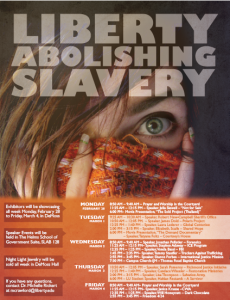Bikinis are on, margarita in hand, and party pants are securely fastened. Spring break here we come!!!
As exciting as spring break vacation is for young people in America, many don’t consider the serious threat that sex trafficking poses in resort areas on American soil during this time. With prime resort locations fluctuating in population by thousands on a daily basis and being easily accessible by highways, many traffickers see this as an opportunity to set up shop for short periods of time with the ability to make quick exits and move to a new location. In some areas, activists and law enforcement have assembled special coalitions to combat the growing problem of sex trafficking, including spring break sex tourism. Activists in Myrtle Beach created the Eastern Carolina Coalition Against Human Trafficking (ECCAHT) to help rescue victims of trafficking and to bring traffickers to justice. Another organization, Kristi House, created Project GOLD to directly address the major problem of child exploitation in the sex industry in Miami, Florida. Through education, these groups are seeking to reduce child exploitation of at-risk youth.
The dangers of human trafficking during spring break rise in foreign and domestic resort areas as thousands of Americans flock to the hottest vacation spots. Although these destinations are popular for tourism, many, such as Cancun, Mexico, Miami and Orlando, Florida, Myrtle Beach, North Carolina and Puerto Rico, are extremely dangerous. They carry high rates of violence associated with drug trafficking and human trafficking, which are often intrinsically linked. It is important to recognize that many of these locations can serve as recruiting grounds for trafficking. Thousands of young college-aged tourists, often with excessive alcohol use and a lack of inhibition, make themselves targets for abduction by traffickers in some of these dangerous resort areas. Reduced inhibitions not only increase the vulnerability of young spring breakers to be trafficked, it may also increase the probability that spring break vacationers will pay for sex. Backpage.com provides the drunk buyer easy access to find paid sex.

It is important that we provide education and awareness to those traveling to a spring break destination in order to decrease the likelihood of young women becoming a trafficker’s next victim. Trafficking and sex tourism is a critical problem throughout the world and groups such as ECCAHT and Kristi House provide us with a good example of how to effectively combat this issue. So as you make your way to the beaches of South Padre, educate yourself and your friends about the threats of sex trafficking. And remember, have fun, be smart, and stay safe!
*If you suspect human trafficking, please report it to the National Human Trafficking Hotline at 1-888-3737-888
 To understand why the average age of entry is so young, we must understand the strategy used by pimps. When many people think of sex trafficking, they think of kidnapped children enslaved in a foreign brothel. However, the commercial sexual exploitation of minors occurs in every corner in the U.S. While kidnapping for the purpose of sex trafficking does occur in America, a common tactic used by pimps is trauma bonding. According to
To understand why the average age of entry is so young, we must understand the strategy used by pimps. When many people think of sex trafficking, they think of kidnapped children enslaved in a foreign brothel. However, the commercial sexual exploitation of minors occurs in every corner in the U.S. While kidnapping for the purpose of sex trafficking does occur in America, a common tactic used by pimps is trauma bonding. According to 







